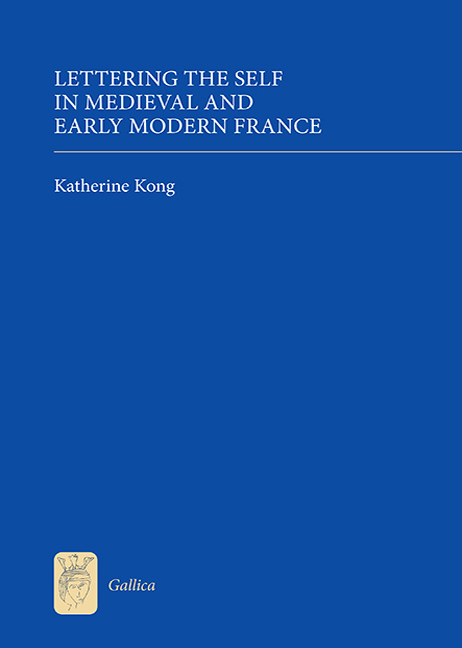Book contents
- Frontmatter
- Contenst
- Acknowledgements
- Introduction
- 1 Love Letters in the Monastery: Ambiguous Lessons and Epistolary Play in the Verses of Baudri of Bourgueil and Constance of Angers
- 2 Writing the Subjunctive into the Indicative: Commanding Performances in the Letters of Abelard and Heloise
- 3 Virilis Femina: Christine de Pizan and the Gender of Letters
- 4 The Pursuit of Spiritual Quietude in the Correspondence of Marguerite de Navarre and Guillaume Briçonnet
- 5 The Foedus Amicitiae of Etienne de la Boétie and Michel de Montaigne
- Conclusion: Conducting Oneself Through Letters
- Bibliography
- Index
- Miscellaneous Endmatter
4 - The Pursuit of Spiritual Quietude in the Correspondence of Marguerite de Navarre and Guillaume Briçonnet
Published online by Cambridge University Press: 28 April 2017
- Frontmatter
- Contenst
- Acknowledgements
- Introduction
- 1 Love Letters in the Monastery: Ambiguous Lessons and Epistolary Play in the Verses of Baudri of Bourgueil and Constance of Angers
- 2 Writing the Subjunctive into the Indicative: Commanding Performances in the Letters of Abelard and Heloise
- 3 Virilis Femina: Christine de Pizan and the Gender of Letters
- 4 The Pursuit of Spiritual Quietude in the Correspondence of Marguerite de Navarre and Guillaume Briçonnet
- 5 The Foedus Amicitiae of Etienne de la Boétie and Michel de Montaigne
- Conclusion: Conducting Oneself Through Letters
- Bibliography
- Index
- Miscellaneous Endmatter
Summary
In the querelle du Roman de la rose, Christine de Pizan's primary criticism of the didactic poem turns on the issue of rhetoric: what is most objectionable about the Rose is that its teaching is cloaked in such lovely language that readers might misunderstand what should be espoused and what should be eschewed in the romance. In her opinion, all writing has a moral function, and so rhetoric has an important role to play in its teachings. A similar concern with the uses and effects of language subtends the early sixteenth-century writings of Marguerite de Navarre, arguably the most influential French woman writer in this moment of transition from the medieval to the early modern. The last and most well-known of her works, the Heptaméron, grapples directly with the powers and even dangers of rhetoric: in the Prologue, the devisants decide to exclude “gens de lectres” (people of letters) from their storytelling project, lest their rhetorical skill interfere with the truth value of the tales. However, Marguerite's writings also explore rhetoric's salutary powers, and her letters in particular investigate how rhetoric, and specifically epistolary rhetoric, can be a vehicle for the experience of spirituality.
Like Christine, Marguerite was a skilled practitioner of the epistolary arts, composing letters in verse and in prose, and employing letters in her fictional writings. However, unlike Christine, her epistolary ventures are not guided by an overarching interest in combating misogyny. Rather, spirituality is Marguerite's principal concern, and its relationship to the worldly receives a complex treatment in the thirteenth nouvelle of the Heptaméron. In this tale, a married captain falls in love with a married woman, professes his love in a letter accompanied by a diamond ring as a pledge of his love, and dies not long after. The virtuous married woman returns the diamond to the captain's wife. She also sends along a forged letter: she writes under the guise of a nun to whom the captain had confessed his sins before his last mortal adventure – and to whom he professed a desire to make amends with his wife upon his return. The happy épistolière preserves her virtue by refusing adulterous love, and she “rights” the wrongs occasioned by the captain's letter, occluding his attempted adultery with the fiction of his marital devotion and returning the precious jewel to the rightful recipient of his amorous gages.
- Type
- Chapter
- Information
- Lettering the Self in Medieval and Early Modern France , pp. 150 - 190Publisher: Boydell & BrewerPrint publication year: 2010



